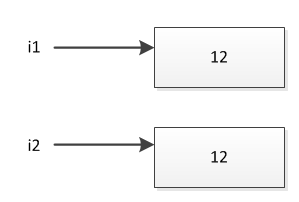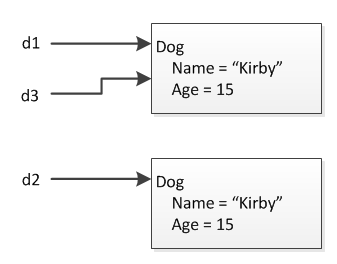#421 – Value Equality and IComparable Example
September 28, 2011 Leave a comment
Here’s a full example of a reference type that supports value equality semantics and implements both IEquatable and IComparable.
public class Rectangle : IEquatable<Rectangle>, IComparable<Rectangle>
{
public int Height { get; set; }
public int Width { get; set; }
public Rectangle(int height, int width)
{
Height = height;
Width = width;
}
public override bool Equals(object obj)
{
return this.Equals(obj as Rectangle);
}
public override int GetHashCode()
{
return Height.GetHashCode() ^ Width.GetHashCode();
}
public bool Equals(Rectangle r)
{
if (ReferenceEquals(r,null))
return false;
return ((Height == r.Height) && (Width == r.Width) ||
(Height == r.Width) && (Width == r.Height));
}
public static bool operator ==(Rectangle r1, Rectangle r2)
{
if (ReferenceEquals(r1, null))
{
return ReferenceEquals(r2, null) ? true : false;
}
return r1.Equals(r2);
}
public static bool operator !=(Rectangle r1, Rectangle r2)
{
return !(r1 == r2);
}
// Result:
// < 0 : this instance less than r
// = 0 : this instance equivalent to r
// > 0 : this instance greater than r
public int CompareTo(Rectangle r)
{
if (ReferenceEquals(r, null))
return 1;
if (this.Equals(r))
return 0;
else if (this.Area() == r.Area())
return this.Width - r.Width;
else
return this.Area() - r.Area();
}
public static bool operator <(Rectangle r1, Rectangle r2)
{
if (ReferenceEquals(r1, null))
return false;
else
return (r1.CompareTo(r2) < 0) ? true : false;
}
public static bool operator >(Rectangle r1, Rectangle r2)
{
if (ReferenceEquals(r1, null))
return false;
else
return (r1.CompareTo(r2) > 0) ? true : false;
}
public static bool operator <=(Rectangle r1, Rectangle r2)
{
return (r1 < r2) || (r1 == r2);
}
public static bool operator >=(Rectangle r1, Rectangle r2)
{
return (r1 > r2) || (r1 == r2);
}
public int Area()
{
return Height * Width;
}
}

